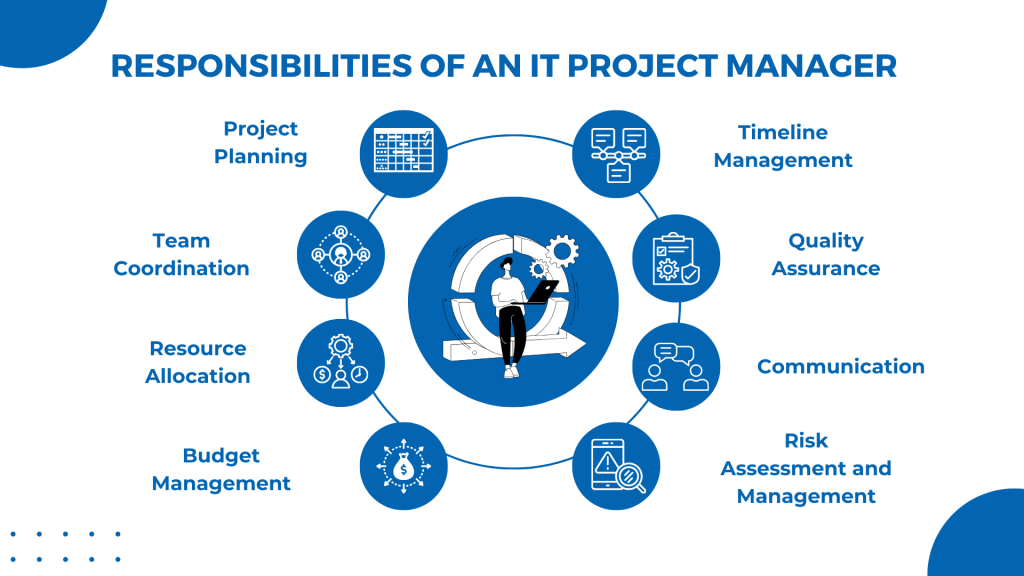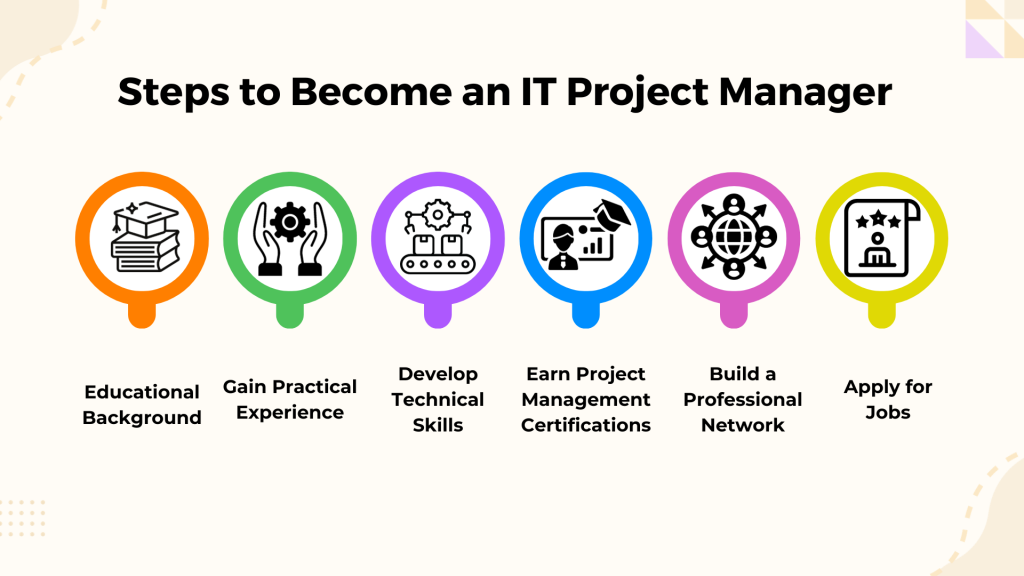
Today, technology projects are becoming increasingly complex, spanning AI deployments, cloud migrations, and cybersecurity rollouts. Each of these initiatives demands someone who can connect technical execution with business outcomes and keep teams aligned through rapid change.
That’s where IT project management comes in. It’s one of the fastest-growing disciplines in the digital era, combining strategy, technology, and leadership to deliver successful outcomes.
| According to the Project Management Institute (PMI), the global demand for project management professionals will grow by 33% by 2027, creating nearly 22 million new roles worldwide, and IT project managers represent a major share of this demand. |
In this guide, we’ll explore everything you need to know, from what an IT Project Manager does to how to build a successful career in this evolving field. Whether you’re transitioning from a technical background or entering the management side of IT, this article will help you understand the skills, challenges, and future of IT project management.
What is an IT Project Manager?
An Information Technology Project Manager is a skilled professional overseeing and managing technology-related projects within an organization. Their primary role is to ensure that IT projects are planned, executed, and completed successfully, meeting specific objectives, deadlines, and budget constraints.
Unlike general project managers, IT project managers work at the intersection of technology and business. They translate technical requirements into actionable project plans, bridge communication between developers and executives, and ensure technology investments create measurable value.
Their work often spans:
- Software and system development projects
- Cloud migrations and infrastructure upgrades
- Cybersecurity and data protection initiatives
- Enterprise system integrations (e.g., ERP, CRM)
A successful IT Project Manager combines technical fluency, strategic thinking, and leadership to manage risks, align stakeholders, and drive digital transformation across teams.
What Does an IT Project Manager Do?
The day-to-day work of an IT Project Manager goes far beyond scheduling tasks or tracking deadlines. Their job is to connect people, technology, and strategy to ensure every IT project delivers measurable business results.
Project Planning
IT Project Managers meticulously plan every aspect of a project, defining its scope, objectives, timelines, and resource requirements. They create detailed project plans that act as roadmaps throughout the project lifecycle.
Team Coordination
They assemble and lead teams of diverse professionals, from programmers and designers to analysts and engineers. IT Project Managers ensure everyone understands their roles and responsibilities, fostering a collaborative and efficient work environment.
Resource Allocation
Managing resources, both human and material, is a crucial aspect. Project Managers allocate tasks based on team members’ skills and expertise, ensuring optimal utilization of available resources.
Budget Management
IT Project Managers are responsible for budgeting and financial aspects of the project. They monitor expenses, track costs, and make sure the project stays within the allocated budget.
Risk Assessment and Management
Identifying potential risks and devising effective risk mitigation strategies is a significant part of their role. They foresee potential challenges, create backup strategies, and handle unexpected issues that might emerge throughout the project.
Communication
IT Project Managers act as intermediaries between technical teams and non-technical stakeholders. They translate complex technical jargon into understandable language for clients and company executives, ensuring everyone is on the same page.
Quality Assurance
They oversee the quality of the project deliverables, ensuring they meet industry standards and client expectations. Quality assurance includes rigorous testing, debugging, and validation processes.
Timeline Management
Keeping the project on schedule is paramount. IT Project Managers monitor timelines closely, making adjustments when necessary to ensure deadlines are met without compromising the project’s quality.
Key Skills and Qualities Required for IT Project Management
Behind every successful IT project lies a project manager who blends technical know-how with strategic and people skills.
In 2025, the role demands more than coordination; it requires cross-domain fluency, digital adaptability, and leadership in the face of change.
Here are the core skills that define top-performing IT Project Managers today:
Technical Proficiency
IT Project Managers need in-depth knowledge of technologies and programming languages, enabling them to understand project complexities and make informed decisions. This expertise allows them to communicate effectively with technical teams and address project challenges confidently.
Effective Communication
Clear and concise communication is essential for IT Project Managers. They must convey complex technical concepts to team members and non-technical stakeholders, fostering a shared understanding of project goals and expectations. Strong communication skills enable them to manage client interactions, address concerns, and maintain transparency throughout the project.
Leadership and Team Management
IT Project Managers excel in guiding diverse teams by delegating tasks, providing clear instructions, and encouraging collaboration. Their leadership skills empower team members, resolve conflicts, and inspire collective achievement. Effective team management includes understanding group dynamics, fostering teamwork, and recognizing and celebrating team successes.
Problem-Solving and Adaptability
Strong problem-solving abilities are crucial for IT Project Managers to identify and resolve issues promptly. They must adapt to changing project requirements, making well-informed decisions under pressure. Proactively anticipating challenges, analyzing root causes, and implementing effective solutions ensures project continuity and success.
Strategic Thinking and Planning
IT Project Managers plan strategically, aligning project objectives with organizational goals. Strategic thinking involves foreseeing potential challenges, planning for contingencies, and making decisions that benefit the project in the long run. Strategic planning ensures that resources are utilized efficiently, and project outcomes align with the overarching organizational strategy.
Data and Digital Tool Proficiency
In 2025, leading IT Project Managers will leverage analytics, dashboards, and AI-powered project tools (e.g., Jira, Monday.com, MS Project, ClickUp).
They use data for forecasting, performance tracking, and smarter project governance. Turning insights into action.
How to Become an IT Project Manager?
Becoming an IT Project Manager involves a strategic and structured approach to developing the necessary skills and expertise. If you’re interested in a career as an IT project manager, take the following steps:
Becoming an IT Project Manager involves a strategic and structured approach to developing the necessary skills and expertise. If you’re interested in a career as an IT project manager, take the following steps:
Educational Background
Start your journey by enrolling in a relevant bachelor’s program, like computer science or business management. These foundational courses provide essential knowledge about IT systems, project management methodologies, and business processes.
Pursuing advanced degrees or specialized certifications, such as a Master’s in Project Management, refines your expertise and enhances your marketability.
Gain Practical Experience
Practical exposure is invaluable. Seek internships or entry-level positions in IT or project management departments. These roles expose you to real-world project scenarios, teaching you to navigate challenges, collaborate in teams, and apply theoretical knowledge.
Volunteer work on community projects or open-source initiatives can provide hands-on experience and demonstrate your commitment to the field.
Develop Technical Skills
Master key technical skills related to IT project management. This includes learning programming languages like Java or Python, understanding database management systems (e.g., SQL), and gaining proficiency in project management software such as Microsoft Project or JIRA.
Building a robust technical foundation enables you to comprehend project complexities, troubleshoot issues, and effectively communicate with technical teams.
Earn Project Management Certifications
Certifications validate your knowledge and signal your commitment to excellence.
Top credentials include:
- PMP® (Project Management Professional) – globally recognized for project leadership.
- PRINCE2® Practitioner – emphasizes structured process control.
- Certified ScrumMaster® (CSM) – ideal for Agile teams.
- CAPM® (Certified Associate in Project Management) – perfect for beginners.
| According to PMI’s Talent Gap Report , organizations will need 88 million project professionals by 2027, making certified project managers among the most in-demand professionals worldwide. |
Build a Professional Network
Actively engage in industry events, conferences, and online forums. Networking exposes professionals in your field, offering mentorship opportunities, industry insights, and potential job openings.
Building relationships with experienced practitioners can provide invaluable advice, expand your knowledge base, and offer diverse perspectives on IT project management challenges and solutions.
Apply for Jobs
Craft a resume highlighting your qualifications as an IT Project Manager, emphasizing areas that showcase your key competencies, such as network maintenance and team management. Utilize impactful action verbs to describe your skills and experience positively.
Prior to applying for a position, thoroughly review the job listing, identifying specific skills and requirements that align with your expertise. Modify your resume accordingly, emphasizing these key points to present yourself effectively to potential employers.
IT Project Manager Salary in 2025
IT Project Managers are among the most well-paid professionals in the technology and business domains.
Their salaries vary depending on experience, certification level, location, and industry specialization (e.g., cloud, fintech, or cybersecurity projects).
Average Annual Salary by Country (Updated)
| Country | Average Annual Salary (USD equivalent) | Source |
| United States | $100,000 – $125,000 | Glassdoor (2025) |
| India | INR 16–20 LPA | PayScale (2025) |
| United Kingdom | £65,000 – £75,000 | Glassdoor (2025) |
| Canada | CA$105,000 – CA$120,000 | Indeed (2025) |
| Australia | AU$115,000 – AU$130,000 | Talent.com (2025) |
| Germany | €70,000 – €85,000 | Glassdoor (2025) |
| Singapore | S$80,000 – S$95,000 | PayScale (2025) |
| UAE | AED 190,000 – AED 220,000 | GulfTalent (2025) |
| South Africa | R480,000 – R600,000 | SalaryExplorer (2025) |
| Switzerland | $120,000 – $135,000 | PMI Talent Report (2025) |
Source: PayScale
What Affects IT Project Manager Salaries?
- Experience Level: Senior IT Project Managers with 10+ years’ experience command 30–40% higher pay.
- Certifications such as PMP®, PRINCE2®, and Agile credentials can significantly increase compensation.
- Industry: IT project managers in finance, cloud, and AI-driven sectors often earn the most.
- Location: Countries with strong digital economies, such as the US, UK, and Switzerland, set global pay scales.
- Technical Stack: Familiarity with DevOps, cloud migration, and AI implementation projects drives higher demand and salary.
Key Challenges that an IT Project Manager Faces
Even the most skilled IT Project Managers encounter challenges that test their adaptability and leadership. In today’s tech-driven landscape, managing people, processes, and platforms has become more complex than ever.
- Controlling evolving project requirements and managing scope changes effectively
- Balancing time, budget, and workforce efficiently to optimize project resources
- Navigating diverse teams, resolving conflicts, and fostering teamwork for project success
- Staying updated with rapid tech changes, integrating new technologies seamlessly into projects
- Managing diverse stakeholder expectations, aligning perspectives, and handling feedback diplomatically
- Anticipating and mitigating unforeseen events, developing contingency plans to address challenges
- Ensuring project deliverables meet high-quality standards through rigorous testing and monitoring
- Efficiently prioritizing tasks, adhering to schedules, and preventing delays for timely project completion
Conclusion
IT Project Managers stand at the intersection of technology, business strategy, and human leadership. As organizations accelerate their digital transformation, the demand for professionals who can turn technical complexity into measurable business outcomes will only intensify.
The next decade will redefine what success looks like for IT Project Managers.
They’ll lead initiatives powered by AI-driven automation, cloud modernization, and cyber-resilient systems, all while nurturing collaboration across hybrid and global teams.
Tomorrow’s standout IT Project Managers will be those who combine technical fluency with emotional intelligence, data-driven decision-making, and an ability to guide organizations through constant change.
It’s no longer just about delivering projects on time; it’s about enabling innovation and long-term value creation. For professionals aiming to future-proof their careers, continuous learning is key. Pursuing certifications from Invensis Learning helps strengthen leadership capabilities and strategic execution skills, qualities every digital-first enterprise now seeks.
















